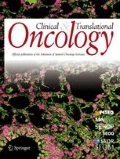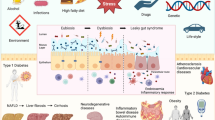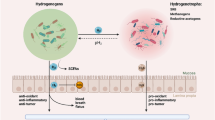Abstract
Objective
Chronic inflammation is recognized as a risk factor for colorectal cancer (CRC) development. Baicalin (BI), a major constituent in an anti-inflammatory herb Scutellaria baicalensis, can be biotransformed into baicalein (BE) by the intestinal microbiota. We evaluated the anti-inflammation and anti-CRC effects of the metabolite BE.
Methods
The in vitro biotransformation by human intestinal microbiota from BI into BE has been determined with HPLC. Using a gut-specific ApcMin/+ mouse model, the effects of oral BE on the life span, organ index, and tumor multiplicity were evaluated. The expressions of inflammatory cytokines were determined using ELISA. To verify the in vivo data, the anti-inflammatory and antiproliferative effects of BE were determined with an in vitro cell model.
Results
HPLC analysis showed that BI was quickly transformed into BE by the intestinal microbiota. Oral BE (30 mg/kg/day) significantly increased the life span, from 125.2 to 218.4 days (P < 0.01%). BE treatment also decreased intestine index and increased spleen index. Compared with the model group, following BE treatment, tumor numbers were significantly reduced in the small intestine and colon (P < 0.01, P < 0.05, respectively). In the gut tissues, BE treatment significantly reduced inflammatory cytokine levels such as IL-1β, IL-2, IL-6, IL-10, G-CSF, and GM-CSF. In vitro data supported our in vivo results that the anti-CRC effects of BE were via the inhibition of gut inflammation and induction of cancer cell death.
Conclusion
Our results suggest that the parent compound BI can be quickly converted into its microbial metabolite BE, which has stronger bioactive effects than BI. Baicalein is an active chemopreventive metabolite for inflammatory associated CRC.





Similar content being viewed by others
References
Fillon M. Study aims to improve colorectal cancer screening rates. CA Cancer J Clin. 2019;69(3):161–3.
Siegel RL, Miller KD, Jemal A. Cancer statistics, 2019. CA Cancer J Clin. 2019;69(1):7–34.
McCarthy N. Tumorigenesis: all together now. Nat Rev Cancer. 2013;13(3):148–9.
Madka V, Rao CV. Anti-inflammatory phytochemicals for chemoprevention of colon cancer. Curr Cancer Drug Targets. 2013;13(5):542–57.
Fang R, Wu R, Zuo Q, Yin R, Zhang C, Wang C, et al. Sophora flavescens containing-QYJD formula activates Nrf2 anti-oxidant response, blocks cellular transformation and protects against DSS-induced colitis in mouse model. Am J Chin Med. 2018;46(7):1609–23.
Cragg GM, Grothaus PG, Newman DJ. Impact of natural products on developing new anti-cancer agents. Chem Rev. 2009;109(7):3012–43.
Li-Weber M. New therapeutic aspects of flavones: the anticancer properties of Scutellaria and its main active constituents Wogonin Baicalein and Baicalin. Cancer Treat Rev. 2009;35(1):57–68.
Kim EH, Shim B, Kang S, Jeong G, Lee JS, Yu YB, et al. Anti-inflammatory effects of Scutellaria baicalensis extract via suppression of immune modulators and MAP kinase signaling molecules. J Ethnopharmacol. 2009;126(2):320–31.
Wang CZ, Li XL, Wang QF, Mehendale SR, Yuan CS. Selective fraction of Scutellaria baicalensis and its chemopreventive effects on MCF-7 human breast cancer cells. Phytomedicine. 2010;17(1):63–8.
Wang CZ, Zhang CF, Chen L, Anderson S, Lu F, Yuan CS. Colon cancer chemopreventive effects of baicalein, an active enteric microbiome metabolite from baicalin. Int J Oncol. 2015;47(5):1749–58.
Yu C, Zhang Z, Zhang H, Zhen Z, Calway T, Wang Y, et al. Pretreatment of baicalin and wogonoside with glycoside hydrolase: a promising approach to enhance anticancer potential. Oncol Rep. 2013;30(5):2411–8.
Shen J, Cao C, Su H, Yang X, Wei Z, Du L. Evidence of gastro-intestinal system as an active and toxic target of sasanqua saponins extract. Exp Toxicol Pathol. 2008;60(1):43–9.
Dworzanski T, Celinski K, Korolczuk A, Slomka M, Radej S, Czechowska G, et al. Influence of the peroxisome proliferator-activated receptor gamma (PPAR-gamma) agonist, rosiglitazone and antagonist, biphenol-A-diglicydyl ether (BADGE) on the course of inflammation in the experimental model of colitis in rats. J Physiol Pharmacol. 2010;61(6):683–93.
Dong N, Xu X, Xue C, Wang C, Li X, Shan A, et al. Ethyl pyruvate protects against Salmonella intestinal infection in mice through down-regulation of pro-inflammatory factors and inhibition of TLR4/MAPK pathway. Int Immunopharmacol. 2019;71(1):155–63.
Zhou Y, Boudreau DM, Freedman AN. Trends in the use of aspirin and nonsteroidal anti-inflammatory drugs in the general US population. Pharmacoepidemiol Drug Saf. 2014;23(1):43–50.
Aggarwal BB, Van Kuiken ME, Iyer LH, Harikumar KB, Sung B. Molecular targets of nutraceuticals derived from dietary spices: potential role in suppression of inflammation and tumorigenesis. Exp Biol Med (Maywood). 2009;234(8):825–49.
Li Q, Shan Q, Sang X, Zhu R, Chen X, Cao G. Total glycosides of peony protects against inflammatory bowel disease by regulating IL-23/IL-17 axis and Th17/Treg balance. Am J Chin Med. 2019;47(1):177–201.
Cheng CS, Chen J, Tan HY, Wang N, Chen Z, Feng Y. Scutellaria baicalensis and cancer treatment: recent progress and perspectives in biomedical and clinical studies. Am J Chin Med. 2018;46(1):25–54.
Kim HI, Hong SH, Ku JM, Lim YS, Lee SJ, Song J, et al. Scutellaria radix promotes apoptosis in non-small cell lung cancer cells via induction of AMPK-dependent autophagy. Am J Chin Med. 2019;47(3):691–705.
Kim H, Jung BJ, Jung JH, Kim JY, Chung SK, Chung DK. Lactobacillus plantarum lipoteichoic acid alleviates TNF-alpha-induced inflammation in the HT-29 intestinal epithelial cell line. Mol Cells. 2012;33(5):479–86.
Compare D, Nardone G. Contribution of gut microbiota to colonic and extracolonic cancer development. Dig Dis. 2011;29(6):554–61.
Sekirov I, Russell SL, Antunes LC, Finlay BB. Gut microbiota in health and disease. Physiol Rev. 2010;90(3):859–904.
Holmes E, Kinross J, Gibson GR, Burcelin R, Jia W, Pettersson S, et al. Therapeutic modulation of microbiota-host metabolic interactions. Sci Transl Med. 2012;4(137):137rv6.
Wang CZ, Huang WH, Zhang CF, Wan JY, Wang Y, Yu C, et al. Role of intestinal microbiome in American ginseng-mediated colon cancer prevention in high fat diet-fed AOM/DSS mice. Clin Transl Oncol. 2018;20(3):302–12.
Day SD, Enos RT, McClellan JL, Steiner JL, Velazquez KT, Murphy EA. Linking inflammation to tumorigenesis in a mouse model of high-fat-diet-enhanced colon cancer. Cytokine. 2013;64(1):454–62.
Jacoby RF, Seibert K, Cole CE, Kelloff G, Lubet RA. The cyclooxygenase-2 inhibitor celecoxib is a potent preventive and therapeutic agent in the min mouse model of adenomatous polyposis. Cancer Res. 2000;60(18):5040–4.
Pharmacopoeia_Committee_of_China. The Chinese Pharmacopoeia, 2015 Edition, vol 1. Beijing: China Medical Science and Technology Press; 2015.
Li M, Shi A, Pang H, Xue W, Li Y, Cao G, et al. Safety, tolerability, and pharmacokinetics of a single ascending dose of baicalein chewable tablets in healthy subjects. J Ethnopharmacol. 2014;156(1):210–5.
Long X, Ye Y, Zhang L, Liu P, Yu W, Wei F, et al. IL-8, a novel messenger to cross-link inflammation and tumor EMT via autocrine and paracrine pathways. Int J Oncol. 2016;48(1):5–12.
Le Bivic A, Hirn M, Reggio H. HT-29 cells are an in vitro model for the generation of cell polarity in epithelia during embryonic differentiation. Proc Natl Acad Sci USA. 1988;85(1):136–40.
Acknowledgements
This work was supported in part by NIH/NCCAM Grants P01 AT004418 and K01 AT005362; Chinese Grants from the 111 Project from the Ministry of Education of China and the State Administration of Foreign Experts Affairs of China (B16046), National Natural Science Foundation of China (81603378), and Natural Science Foundation of Jiangsu Province (BK20160545).
Author information
Authors and Affiliations
Contributions
CZW and CSY designed the study, set up the experiments, participated in data collection, analyzed and interpreted the results, and drafted the manuscript. CFZ, HY, CY, LC, JY, WHH, JYW, and JZ carried out some experiments and participated in the related data interpretations. CZW, CSY, YL and WRS revised the manuscript. All authors have read and approved the final manuscript.
Corresponding author
Ethics declarations
Conflict of interest
The authors declare that they have no conflict of interest.
Ethics approval
The use and care of animals were implemented with consideration of the guidelines approved by the Institutional Animal Care and Use Committee at the University of Chicago (ACUP number: 70917, approved on February 12, 2015).
Informed consent
The research did not involve human participants.
Additional information
Publisher's Note
Springer Nature remains neutral with regard to jurisdictional claims in published maps and institutional affiliations.
Rights and permissions
About this article
Cite this article
Wang, CZ., Zhang, CF., Luo, Y. et al. Baicalein, an enteric microbial metabolite, suppresses gut inflammation and cancer progression in ApcMin/+ mice. Clin Transl Oncol 22, 1013–1022 (2020). https://doi.org/10.1007/s12094-019-02225-5
Received:
Accepted:
Published:
Issue Date:
DOI: https://doi.org/10.1007/s12094-019-02225-5




